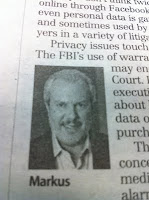As a public service, I will encapsulate a significantly more prolix work evincing perhaps not the same commitment to quality as Mr. Black’s. Let’s look just at the majority’s opening line in the en banc Gilbert decision:
Ezell Gilbert, a federal prisoner, wants to have an error of law in the calculation of his sentence corrected based upon a Supreme Court decision interpreting the sentencing guidelines, even though that decision was issued eleven years after he was sentenced.Truly pregnant: There was an error. At sentencing. No one doubts that. Hell, the Supreme Court said so. But this guy, this “federal prisoner”, wants to have it fixed now.He wants us to correct a sentence eleven years later. Well, where’s it going to stop? How many more of he are there?
All that follows is structured in the predictable way: “He” is a hapless, unrepetent, common criminal. The opinion preempts sympathy by pointing out that, even if he has a point, his sentence might well be the same—then graciously allows that it might be less. Ultimately, it erects “finality of judgment” as the bulwark shielding civilized and free society from such incorrigibles, even taking liberties with Justice Powell, having already violated Justice Holmes.
The short answer to all of it: It is just the sentence, not the judgment, being challenged. Finality is not implicated. Once that dawns, lines like this seem ludicrous: “A federal prisoner’s right to have errors in the calculation of his sentence corrected is not without limits.” No? Well, why not? You can’t just apply the new Supreme Court case and reset the sentence? What’s the big deal? It’s not like anyone’s asking for a trial or anything.
What must have driven Judge Hill to write the scathing dissent D.O.M. quoted at some length the other day is this reduction—this cheapening—of the judicial function from guardian of fairness to administrator of burdens. To claim that there is a higher value than ensuring that Americans are not capriciously incarcerated and that value is finality “of judgment” when really you mean “of penalty” is to abandon excellence as an aspiration. (And they know it; by violently distorting Holmes in ¶ 1, the majority seeks to cloak its abdication with excellence-by-association.) The fright for the future and lack of faith in our institutions that this abandonment symptomizes is so commonplace now that it escapes our notice—until we contrapose it with an image like Roy Black has painted with his essay.

 What? How do you possibly square that holding with the rule itself which specifically says that experts are people who gain specialized knowledge through “experience, training, or education”? Has no one on the Eleventh Circuit ever seen My Cousin Vinny?
What? How do you possibly square that holding with the rule itself which specifically says that experts are people who gain specialized knowledge through “experience, training, or education”? Has no one on the Eleventh Circuit ever seen My Cousin Vinny? 






